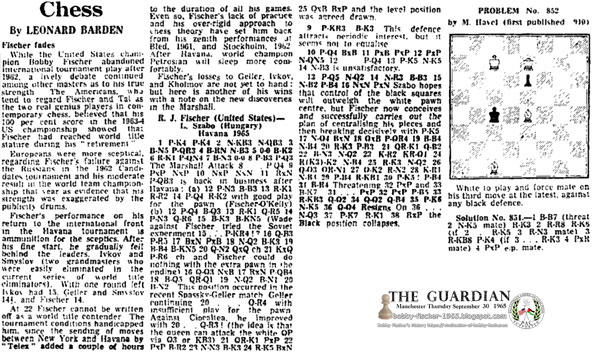The Guardian London, Greater London, England Thursday, September 30, 1965 - Page 14
Chess by Leonard Barden
Fischer fades
While the United States champion Bobby Fischer abandoned international tournament play after 1962, a lively debate continued among other masters as to his true strength. The Americans, who tend to regard Fischer and Tal as the two real genius players in contemporary chess, believed that his 100 per cent score on the 1963-4 US championship showed that Fischer had reached world title stature during his “retirement”.
Europeans were more skeptical, regarding Fischer's failure against the Russians in the 1962 Candidates tournament and his moderate result in the world team championship that year as evidence that his strength was exaggerated by the publicity drums.
Fischer's performance on his return to the international front in the Havana tournament is ammunition for the skeptics. After his fine start, he gradually fell behind the leaders. Ivkov and Smyslov (two grandmasters who were easily eliminated in the current series of world title eliminators). With one round left Ivkov had 15. Geller and Smyslov 14½, and Fischer 14.
At 22 Fischer cannot be written off as a world title contender. The tournament conditions handicapped him, since the sending of moves between New York and Havana by “Telex” added a couple of hours to the duration of all his games. Even so, Fischer's lack of practice and his over-rigid approach to chess theory have set him back from its zenith performances at Bled, 1961, and Stockholm, 1962. After Havana, world champion Petrosian will sleep more comfortably.
Fischer's losses to Geller, Ivkov, and Kholmov are not yet to hand: but here is another of his wins with a note on the new discoveries in the Marshall. R. J. Fischer (United States) L. Szabo (Hungary) Havana 1965… The Marshall Attack … is back in business after Havana … with good play for the pawn (Fischer-O'Kelly) … (Wade against Fischer tried the Soviet experiment … and Fischer could do nothing with the extra pawn in the ending … This position occurred in the recent Spassky-Geller match. Geller continuing … with insufficient play for the pawn against Ciocaltea, he improved with …(the idea is that the Queen can attack the white … and the level position was agreed drawn.
This defense attracts interest, but it seems not to equalize.
… is unsatisfactory.
Szabo hopes that control of the black squares will outweigh the white pawn center, but Fischer now conceives and successfully carries out the plan of centralizing his pieces and then breaking decisively with …
Threatening … the Black position collapses.























